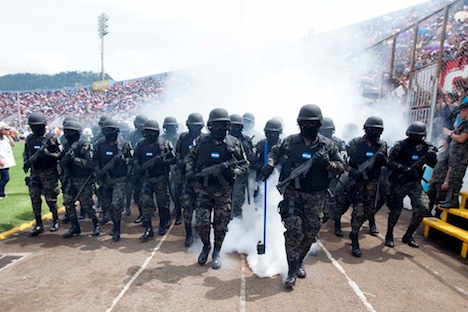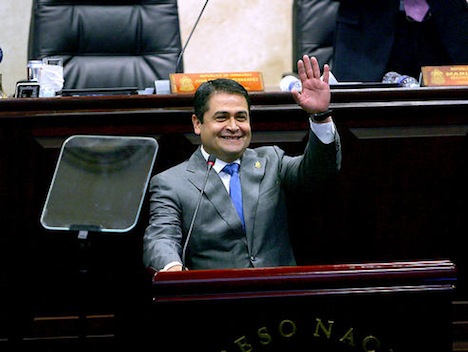What’s most unusual about today’s inauguration of Juan Orlando Hernández as the next president of Honduras is that so much of his agenda is already in place.![]()
Upon taking office today, Hernández (pictured above) will face daunting security, economic and political challenges.
But on at least a few matters, he’ll take office with key elements of his agenda already in place, thanks to the efforts of the outgoing administration of Porfirio Lobo Sosa and the wide majority of the Partido Nacional (PN, National Party) in the outgoing Congreso Nacional (National Congress). Hernández served as president of the National Congress from 2010 to 2014. The transition from Lobo Sosa to Hernández marks the first time since the return of democracy to Honduras in 1981 that the conservative National Party will hold two consecutive presidential terms (Honduran presidents are constitutionally ineligible to run for reelection).
Hernández takes office today, but he does so after enacting several key security and fiscal policies in the final months and weeks of the Lobo Sosa administration, including a new, less controversial national police chief, a new military police force, landmark fiscal reforms (including a wide tax increase) and a plan to privatize Honduras’s public electricity company. Last weekend, the new National Congress was sworn in, which means that the National Party will control just 48 seats in the 128-member unicameral parliament, a sharp reduction from the 75-seat bloc that Hernández commanded during the Lobo Sosa era.
From ‘whatever it takes’ to ‘the party is over’
Even before the election campaign reached full swing, Hernández last September pushed through legislation authorizing the creation of a new policia militar (‘military police’) that will deploy in full force early this year, and he campaigned on a slogan to do ‘whatever it takes’ (¡voy hacer lo que tenga que hacer!) to make Honduras safe. The controversial legislation creates an elite militarized unit loyal to Hernández that (hopefully) won’t be corrupted by organized crime and drug traffickers, which have already infiltrated much of the Honduran police and military. Critics worry that the new military police could trample human rights in a country barely three decades removed from death squads. Many Hondurans fear the police more than drug traffickers and criminal gangs.
Late in December 2013, Lobo Sosa fired the head of Honduras’s national police, Juan Carlos Bonilla, known as ‘El Tigre.’ Bonilla had become a controversial figure, given alleged ties to the death squads of the 1980s. Since becoming the head of Honduras’s national police force in August 2012, Bonilla became linked to a trend of humanitarian violations at the hands of the national police, including beatings, illegal detentions and other harassment of gay and lesbian Hondurans, journalists and leftists in political opposition to the current administration. Bonilla also seemed either unwilling or unable to crack down on rampant corruption within his ranks. Given that police salaries are a pittance, however, reforming the national police force could prove just as difficult in the Hernández era as well.
Bonilla’s removal represents one less headache for Hernández, who would have continued to face ongoing skepticism from both within and outside Honduras over Bonilla’s leadership. But there’s no sign that the future will be any less corrupt or any more respectful of human rights — and no clear sign that Bonilla’s successor, Ramón Sabillón, previously the commander of the national police’s special investigations division, will do any better.
Stabilizing Honduras will be Hernández’s top challenge in the next four years, and he’s staked his presidency on doubling down with a military solution rather than a strategy of community-based policing. Though the United Nations The United Nations Office on Drugs and Crime recorded a rate of 91.6 per 100,000 in 2011, but the Violence Observatory at the National Autonomous University of Honduras estimated a rate of 85.5 in 2012 and just 80 per 100,000 in 2013. While that’s a significant drop, it still means that Honduras has the world’s highest homicide rate.
In his inaugural address today, Hernández declared that for criminals, se le terminó la fiesta (‘the party is over), and he wasted no time in announcing a massive military operation, Operácion Morazán, named after Honduras’s founding father. To that end, Hernández indulged a demonstration at his inauguration earlier today of Los Tigres, one unit of Honduras’s increasingly militarized network of squads and paramilitary police forces (pictured above).
Rigoberto Chang Castillo, a top Hernández ally, has become Honduras’s new interior and population minister, and rising National Party star Reinaldo Sánchez will become the minister of the presidency.
Bilateral relations with the United States and drug policy
One of the most surprising aspects to Hernández’s inaugural address, however, was a stern admonishment of US drug policy. Declaring a double standard, Hernández spoke out against the United States for its role in Honduras’s state, noting that North American demand for drugs has fueled so much violence throughout Latin America, and that while drugs are merely a ‘health’ issue for US consumers, it’s a matter of life and death for Honduras, which fights traffickers with limited resources — and the blood of its own people: Continue reading Hernández takes office with agenda already largely in place



